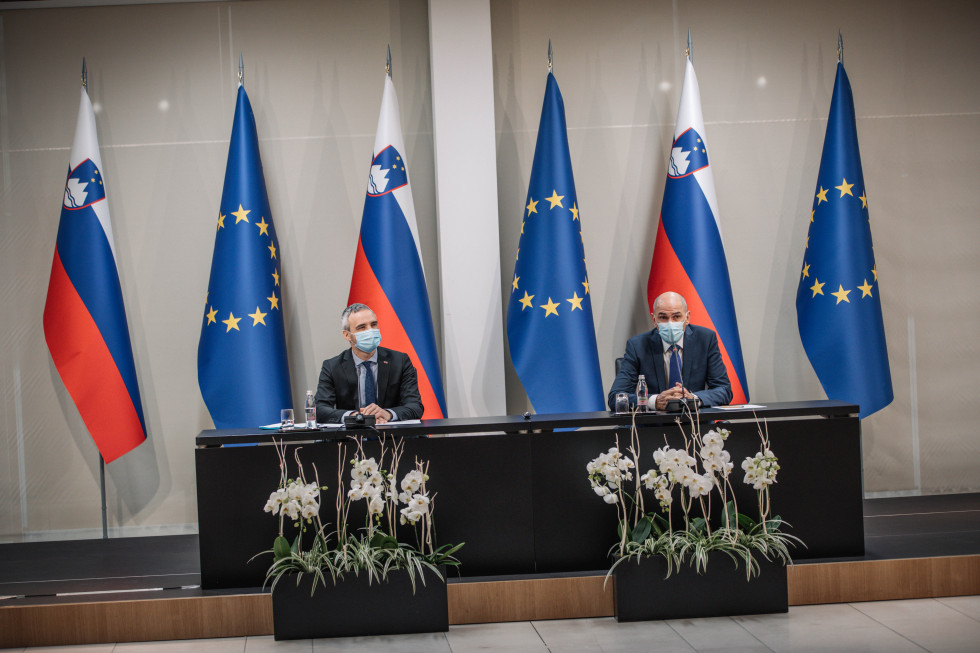By: gov.si
Prime Minister Janez Janša and Minister of Labour, Family, Social Affairs and Equal Opportunities Janez Cigler Kralj, held a press conference today in Brdo pri Kranju to provide an update on vaccination against COVID-19 and present the eighth Anti-Corona Package to mitigate the consequences of the epidemic.
“The data available today regarding vaccination against COVID-19 is better than last week, as the European Medicines Agency has given the go-ahead for the sixth dose of the BioNTech, Pfizer vaccine. This vaccine, the first approved, has been ordered in the largest quantities by Europe, and also by Slovenia,” said the Prime Minister, adding that as a result of this the number of doses available had been increased by approximately 20%. “In addition, another order in large quantities was made last week as part of joint orders of the European Commission. In any event, Slovenia has ensured the percentage that belongs to us, that is 0.47% of the joint order in accordance with Slovenia’s relative population in the EU. However, we are competing for even more, namely for twice as much,” said the Prime Minister, adding that so far the country has always managed to receive more than the proportion that would be assigned based on population alone.
The Prime Minister pointed out that the quantities of the vaccine ordered and already approved for Slovenia from Pfizer and BioNTech amount to over two and a half million doses, and from Moderna almost half a million doses. “The total number of doses is over three million for Slovenia; since two doses are needed, this means that with regard to the deliveries of vaccines that have already been approved and are in use, the doses will suffice for 1,600,000 individuals this year,” stressed the Prime Minister. He added that at least three more vaccines were under review, with AstraZeneca’s being the closest to approval, which could be approved by the European Medicines Agency on 29 January. “This vaccine is easier to distribute and produce as it is a conventional one, and it will be available in the first half of the year in very large quantities. We have reserved and ordered 1,400,000 doses, also approved by the European Commission,” said the Prime Minister.
The Prime Minister added that since December 27, when vaccination of elderly and medical staff started, the country has also gained certain experience of the vaccination process. “Vaccinations in care homes have been very successful, and the response in healthcare institutions has been better than initially announced. There have been some misunderstandings as to what to do if a dose remains and whether those administering vaccinations are allowed to make decisions on vaccinations or not. In some cases, strict observation of the rules did not take place. As soon as we received information about this, the inspection started to carry out its control procedures, “said the Prime Minister, and in order to avoid any confusion among the general public, he presented the instructions. “The priority groups set out in the national vaccination strategy adopted and published on 3 December, based on the European strategy, are strictly observed. The principle of the strategy is that the vaccine is given first to those at increased risk of severe illness. On the basis of these two criteria, every doctor can autonomously and professionally set the order in the relevant priority age group,” said Prime Minister Janez Janša. He also said that “if there are any dilemmas about how this works, it is relatively simple, especially now when the number of available doses of the vaccine per person is relatively small, meaning that there is no problem if someone who has been scheduled to come fails to appear, as may always happen. In such cases, the person administering vaccinations must have a list of priority individuals in the same category prepared in advance, to make sure that the priorities are strictly observed.” Prime Minister Janez Janša pointed out that there is no room for ambiguity or any other interpretation, “in particular now when there is significantly more interest in the vaccine than doses available.”
Minister Cigler Kralj presented in more detail the eighth Anti-Corona Package focused on jobs or companies’ ability to hire. Thanks to the measures taken so far in this area, Slovenia ranks high with regard to the low number of individuals who have become unemployed due to the epidemic.
Two main measures in the package will be the extension of the possibility of using 80% compensation for employees on furlough. The measure will be extended from 31 January to the end of April this year. The measure regarding the reduction of working hours will also be extended.
Moreover, an essential element of this package will be government aid to employers due to the increased labour costs as a result of the higher minimum wage. The Minister estimated that by using the anticipated model the government will be able to relieve 40 percent of such costs borne by employers. The duration of this aid will be until the end of June, with the possibility of extension.
Some other measures from previous packages will also be extended in this one.

